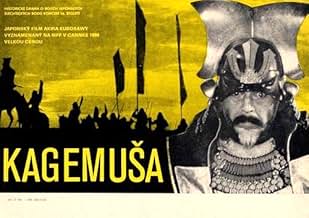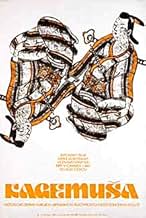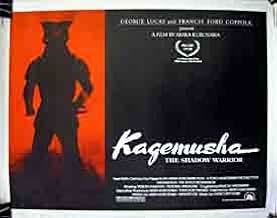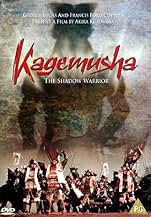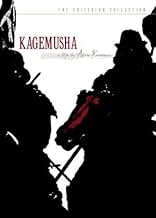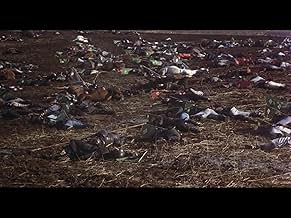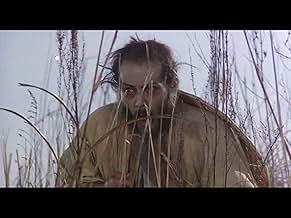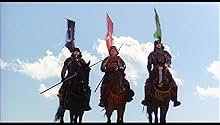AVALIAÇÃO DA IMDb
7,9/10
39 mil
SUA AVALIAÇÃO
Um pequeno ladrão com uma forte semelhança com um senhor da guerra samurai é contratado como um duplo do senhor. Quando ele morre, o ladrão é forçado a pegar em armas em seu lugar.Um pequeno ladrão com uma forte semelhança com um senhor da guerra samurai é contratado como um duplo do senhor. Quando ele morre, o ladrão é forçado a pegar em armas em seu lugar.Um pequeno ladrão com uma forte semelhança com um senhor da guerra samurai é contratado como um duplo do senhor. Quando ele morre, o ladrão é forçado a pegar em armas em seu lugar.
- Indicado a 2 Oscars
- 20 vitórias e 5 indicações no total
- Direção
- Roteiristas
- Elenco e equipe completos
- Produção, bilheteria e muito mais no IMDbPro
Enredo
Você sabia?
- CuriosidadesMuch of the film recounts actual historical events, including Shingen's death and the two-year secret, and the climactic Battle of Nagashino in 1575. Those scenes are also modeled closely on detailed accounts of the battle.
- Erros de gravaçãoIn the final battle there are at least 100 riflemen shown firing their matchlock rifles in volleys. The smoke generated by the matchlocks almost immediately dissipates. This indicates a more modern gunpowder was used in the matchlocks as the historically correct black powder load would blanket the battlefield with thick smoke after a handful of volleys.
- Citações
Nobukado Takeda: The shadow of a man can never stand up and walk on its own.
- Versões alternativasIn the original Japanese version, there are 20 minutes featuring Kenshin Uesugi. For some reason, these scenes were cut out of the USA version.
Avaliação em destaque
What happens to the doppelganger when the original dies? Does he flitter out of existence or does he find his own. Kagemusha (shadow warrior in Japanese) is the story of a thief who is to be hanged, but is saved by a warlord's brother, Katsuyori Takeda, because of a peculiar resemblance to the king Shingen Takeda. Tatsuya Nakadai brilliantly plays both roles of Shingen and the thief. The thief is trained to fill in as Shingen's double, a position previously played by his brother Katsuyori. Shingen receives a mortal wound during a siege and the Takeda Clan retreat. His dying wish is that he wants his death not to be known for at least three years. Kagemusha eventually acquiesces to the role of not just doubling for the king, but being a figurehead twenty-four hours a day.
The intimate circle of Shingen's family and guard knows about the double. They advise him about how to be like Shingen. He plays the part well. Shingen's son Nobukado, who knows that he is the double, is convinced that his father did this to spite him. Nobukado was passed over as king and that position was granted to Shingen's grandson and Nobukado's son Takemaru as soon as he reaches of mature age. Later in the film, we realize that Shingen did this because Nobukado is too aggressive and is not leader material, not to spite him. The backing of Kagemusha helped Nobukado's one great military victory. Nobukado would forever be in Shingen's shadow.
The relationships between the thief and the Lord's men make this a fascinating film. There is a rich tapestry of multidimensional characters. To some critics the action was too slow. It was not as fast paced as The Seven Samurai or Yojimbo. I think it is a mature film from a maturing director who would go on to direct another of my favorite films Ran. This film was nominated for two academy awards and would co-win the grand prize at the Cannes Film Festival. The juxtaposition between the titanic and minute is a favorite concept of Kurosawa. Stolid men have tragic faults. Beggars can be kings.
Kurosawa is one of the world's most famous directors. Yet in the 1980's, he did not get much respect from his home country Japan. He had not had released a film since 1975 -- the beautiful and brilliant Dersu Uzala and he was reportedly suicidal. This film would not have been made if it were not for George Lucas and Francis Ford Coppola whom helped finance this film. Lucas has always been a big fan of Kurosawa. Star Wars was partially influenced by Kurosawa's film The Hidden Fortress. I am a big fan of Kurosawa too. His films always have the most beautiful cinematography, intricate plots and grand characters. Kagemusha is no exception.
The intimate circle of Shingen's family and guard knows about the double. They advise him about how to be like Shingen. He plays the part well. Shingen's son Nobukado, who knows that he is the double, is convinced that his father did this to spite him. Nobukado was passed over as king and that position was granted to Shingen's grandson and Nobukado's son Takemaru as soon as he reaches of mature age. Later in the film, we realize that Shingen did this because Nobukado is too aggressive and is not leader material, not to spite him. The backing of Kagemusha helped Nobukado's one great military victory. Nobukado would forever be in Shingen's shadow.
The relationships between the thief and the Lord's men make this a fascinating film. There is a rich tapestry of multidimensional characters. To some critics the action was too slow. It was not as fast paced as The Seven Samurai or Yojimbo. I think it is a mature film from a maturing director who would go on to direct another of my favorite films Ran. This film was nominated for two academy awards and would co-win the grand prize at the Cannes Film Festival. The juxtaposition between the titanic and minute is a favorite concept of Kurosawa. Stolid men have tragic faults. Beggars can be kings.
Kurosawa is one of the world's most famous directors. Yet in the 1980's, he did not get much respect from his home country Japan. He had not had released a film since 1975 -- the beautiful and brilliant Dersu Uzala and he was reportedly suicidal. This film would not have been made if it were not for George Lucas and Francis Ford Coppola whom helped finance this film. Lucas has always been a big fan of Kurosawa. Star Wars was partially influenced by Kurosawa's film The Hidden Fortress. I am a big fan of Kurosawa too. His films always have the most beautiful cinematography, intricate plots and grand characters. Kagemusha is no exception.
- SamuraiNixon
- 11 de set. de 1999
- Link permanente
Principais escolhas
Faça login para avaliar e ver a lista de recomendações personalizadas
Detalhes
- Data de lançamento
- Países de origem
- Idioma
- Também conhecido como
- Kagemusha: The Shadow Warrior
- Locações de filme
- Himeji Castle, Himeji, Japão(Nobunaga's castle)
- Empresas de produção
- Consulte mais créditos da empresa na IMDbPro
Bilheteria
- Orçamento
- US$ 6.000.000 (estimativa)
- Faturamento bruto nos EUA e Canadá
- US$ 4.000.000
- Faturamento bruto mundial
- US$ 4.018.532
- Tempo de duração3 horas
- Cor
- Mixagem de som
- 4-Track Stereo(original version)
- Proporção
- 1.85 : 1
Contribua para esta página
Sugerir uma alteração ou adicionar conteúdo ausente

Principal brecha
By what name was Kagemusha, a Sombra de um Samurai (1980) officially released in Canada in French?
Responda

